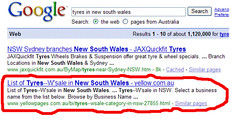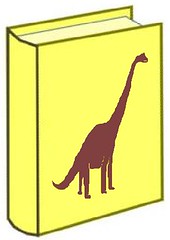W3C Issues Mobile App Guidelines
The World Wide Web Consortium (“W3C”) announced today a mobile web best practices document, providing standards intended to improve the user experience of the web on mobile devices.
This is good, because it will help promote better standards across mobile application development. Until now, developers have been all over the map in terms of how such apps or mobile-enabled sites are created.
So, the big question in my mind — what sort of domain name do they recommend for mobile apps?!? Do they recommend using the .mobi top level domain (“TLD”)? (more…)
Possible Related Posts
Posted by Chris of Silvery on 07/29/2008
Permalink | |  Print
| Trackback | Comments (0) | Comments RSS
Print
| Trackback | Comments (0) | Comments RSS
Filed under: Mobile Search .mobi, mobile applications, mobile standards, wireless applications
Print Yellow Pages Usage On Decline Or Not?
 My article on how the “Yellow Pages Usage Stats Are Likely Wrong” went up earlier at Search Engine Land, and the details I highlight in it provide some strong circumstantial evidence that this year’s earlier industry statistics stating that print YP book usage hadn’t dropped over the year previous are likely incorrect.
My article on how the “Yellow Pages Usage Stats Are Likely Wrong” went up earlier at Search Engine Land, and the details I highlight in it provide some strong circumstantial evidence that this year’s earlier industry statistics stating that print YP book usage hadn’t dropped over the year previous are likely incorrect.
As I point out, those statistics were all based on telephone polling, and those polls missed having representative samples of cell phone only households, according to their published methodology. Various research groups and government agencies have been saying that this is a significant chunk of the population — anywhere from 13.6%, growing to as much as 25% by the end of this year. (more…)
Possible Related Posts
Posted by Chris of Silvery on 07/29/2008
Permalink | |  Print
| Trackback | Comments (0) | Comments RSS
Print
| Trackback | Comments (0) | Comments RSS
Filed under: Advertising, Local Search, Market Data, Yellow Pages cell phone usage, polling, polls, Yellow Pages, YP
SMX LoMo Keynote: Gur Kimchi
Gur Kimchi, Principle Architect for Microsoft’s Virtual Earth, also spoke Thursday morning at the SMX Local & Mobile conference in San Francisco.

Gur Kimchi, Principal Architect, Microsoft Virtual Earth
Gur provided a lot of demonstrations of existing and upcoming features from the Virtual Earth teams: (more…)
Possible Related Posts
Posted by Chris of Silvery on 07/28/2008
Permalink | |  Print
| Trackback | Comments (0) | Comments RSS
Print
| Trackback | Comments (0) | Comments RSS
Filed under: Conferences, MSN Search, Research and Development Local Search, Maps, MicroSoft, SMX LoMo, SMX-Local-&-Mobile, Virtual Earth
SMX LoMo Keynote: Frazier Miller
Frazier Miller, General Manager of Yahoo! Local, spoke yesterday here at the SMX Local & Mobile conference in San Francisco.
It was very interesting to hear the take on local & mobile from one of Yahoo! Local’s top thought leaders. It was obvious that Frazier has a very tight grip on understanding what motivates consumers and where the trends may be headed in local/mobile evolution.
Some highlights of Frazier’s presentation included: (more…)
Possible Related Posts
Posted by Chris of Silvery on 07/25/2008
Permalink | |  Print
| Trackback | Comments (0) | Comments RSS
Print
| Trackback | Comments (0) | Comments RSS
Filed under: Conferences, Local Search, Mobile Search, Yahoo Local Search, Mobile Search, SMX LoMo, SMX-Local-&-Mobile, Yahoo-Local
Australian Yellow Pages Finally Optimizes For Search Engines
 The Australian edition of Lifehacker reports that Sensis, Telestra’s yellow pages division, has finally allowed bots to crawl their online yellow pages so links to their listings are now showing up in Google SERPs and other search engines. Previously, they were apparently blocking Google and bots by either using robots.txt disallow rules and/or blocking the bots with network access rules.
The Australian edition of Lifehacker reports that Sensis, Telestra’s yellow pages division, has finally allowed bots to crawl their online yellow pages so links to their listings are now showing up in Google SERPs and other search engines. Previously, they were apparently blocking Google and bots by either using robots.txt disallow rules and/or blocking the bots with network access rules.

Australian Yellow Pages in Google results (click to enlarge)
Amusingly, Lifehacker mentions, (more…)
Possible Related Posts
Posted by Chris of Silvery on 07/24/2008
Permalink | |  Print
| Trackback | Comments (0) | Comments RSS
Print
| Trackback | Comments (0) | Comments RSS
Filed under: Google, Local Search, Local Search Optimization, Online Directories, Search Engine Optimization, SEO, Yellow Pages Australian Yellow Pages, local-SEO, Search Engine Optimization, Sensis, SEO, Telestra, Yellow Pages
Google Street View Attacked As Potential Tool For Child Predators
The Stop Child Predators organization has launched a campaign specifically targeting Google’s Street View as a tool that potentially enables predators to stalk and kidnap children more effectively.

Kids playing at a park in Google Street View
A video on the site presents Stacie Runemap, Executive Director of the organization, outlining how Street View shows pictures of neighborhoods, homes, playgrounds, schools and pics of kids. She further describes how Google Maps can be used to plot distances from your doorstep to bus stops and schools, suggesting that child predators could use the service to plan attacks or kidnappings. The site elsewhere describes how to request that Google remove photos from Street View. (more…)
Possible Related Posts
Posted by Chris of Silvery on 07/23/2008
Permalink | |  Print
| Trackback | Comments (0) | Comments RSS
Print
| Trackback | Comments (0) | Comments RSS
Filed under: Google, Maps, Security Child Protection, Google Street View, Google-Maps, Internet Privacy, Internet Security, privacy
Top 25 Things Vanishing from America: The Yellow Pages
AOL’s Walletpop blog has created a list of the Top 25 Things Vanishing from America. They listed “The Yellow Pages” as item number 24, along with such things as outhouses, classified ads, dial-up internet access, phone landlines, VCRs, cameras that use film, and more.
I’ve written before about how print yellow pages usage is decreasing due to the internet and mobile phones, and even internet yellow pages usage may be dropping due to newer generations becoming less aware of what yellow pages are. Others such as Bill Gates have also predicted the end of the print yellow pages while analysts such as those with The Kelsey Group have only predicted a sharper decline in usage of print YP this year, compared with last. [* This last sentence subsequently corrected after publication – see below.]
So, when will print yellow pages ultimately go the way of the dinosaur?
It’s unclear since some analysts have predicted a 3% overall decline per year for printed YP income, while others have stated the rate could be accelerating, with print YPs dying off within about 10 years. Also, some claim the demise of the printed directories is greatly exaggerated, since some smaller and more-specialized directories have seen increases in business.
What is clear is that increasing access to alternative sources of information in the way of internet local search, 411 services, and search-enabled mobile phones are definitely eroding usage of print YPs by some degree.
Yellow pages would seem to have already moved past the tipping point — when people begin listing YP books nostalgically as icons of the past, and when consumers are demanding that YP companies stop dropping books on their doorsteps — it seems like the end may be drawing near. If it is an accelerating business trend, no amount of guerrilla marketing, nanotechnology, and possibly questionable YP usage statistics will prop up the larger companies dependent on this business model unless they diversify rapidly.
[* The sentence in paragraph two originally read “Others such as Bill Gates and The Kelsey Group have also predicted the end of the print yellow pages.” That sentence originally only mentioned Bill Gates when I was still drafting it, and I accidentally rendered it incorrect when I added in mention of The Kelsey Group without properly qualifying that they have only predicted some erosion of print usage. The Kelsey Group has not to my knowledge predicted an absolute end of the print YP industry.]
Possible Related Posts
Posted by stephan of stephan on 07/21/2008
Permalink | |  Print
| Trackback | Comments (0) | Comments RSS
Print
| Trackback | Comments (0) | Comments RSS
Filed under: Local Search, Yellow Pages print-yellow-pages, Yellow Pages, yellow pages books
Google Launches New Virtual Reality: Lively
Google has finally launched the long-awaited Lively virtual reality service.
Will it be a SecondLife killer, as some have suggested? So far, no, since it doesn’t have one huge planet or room for interacting with everyone as SecondLife does.
But this is the first baby-step Google has taken into VR, and we can expect them to evolve it further, particularly if the service proves popular. I haven’t tried it out just yet, but the feature descriptions include adding VR rooms to webpages, pulling photos and vids into the VR environments, and tying it closely to Google Talk – Google’s chat service. (more…)
Possible Related Posts
Posted by Chris of Silvery on 07/08/2008
Permalink | |  Print
| Trackback | Comments Off on Google Launches New Virtual Reality: Lively | Comments RSS
Print
| Trackback | Comments Off on Google Launches New Virtual Reality: Lively | Comments RSS
Filed under: Futurism, Google, technology Google, Lively, virtual-reality, VR
The Long Tail A Myth? Study Calls It Into Question
A Wall Street Journal Article today cites a study by Anita Elberse, a marketing professor at Harvard’s business school, entitled, “Should You Invest in the Long Tail?“, which finds evidence that in the online world, consumers gravitate towards the most-popular items just as in the offline world.
The Long Tail, if you don’t already know, refers to a theory promoted by a book by Chris Anderson titled “The Long Tail”, which describes a sort of niche strategy of business, such as employed by Amazon.com or Netflix, that sell a large number of unique items in relatively small quantities. The idea is that while you can obviously sell large numbers of a few popular items (the “head”), the cumulative, smaller number of sales of all your many less-popular items (the “tail”) might easily add up to a far greater total amount.

“Head” items shown in red, “Tail” items shown in blue
Here at Netconcepts, we’ve been promoting the Long Tail concept in relation to natural search marketing for quite some time, since we’ve witnessed how its application can directly improve a business’s overall sales numbers. Indeed, businesses often get the most sales per item for their most popular products, but those products are also often the most competed on the internet, and sometimes the hardest to promote as a result. Even in the cases of top online retailers, we’ve seen that greater bulks of traffic and associated sales may often come from the bulk of less-popular Tail products. (more…)
Possible Related Posts
Posted by Chris of Silvery on 07/02/2008
Permalink | |  Print
| Trackback | Comments Off on The Long Tail A Myth? Study Calls It Into Question | Comments RSS
Print
| Trackback | Comments Off on The Long Tail A Myth? Study Calls It Into Question | Comments RSS
Filed under: Marketing, Monetization of Search, Reference Material, Research and Development, Search Engine Optimization, SEO Chris Anderson, niche marketing, The Long Tail
Google Photos To Compete With Flickr?
The Google Operating System blog reports that Google is likely changing the name of their Picasa photo sharing service to “Google Photos”.
A few other features are due to rollout as well, including licensing options, email photo uploads, and tagging of people in pics. (more…)
Possible Related Posts
Posted by stephan of stephan on 07/01/2008
Permalink | |  Print
| Trackback | Comments Off on Google Photos To Compete With Flickr? | Comments RSS
Print
| Trackback | Comments Off on Google Photos To Compete With Flickr? | Comments RSS
Filed under: Google, Image Optimization flickr, Google, Google Photos, image sharing, Picasa



